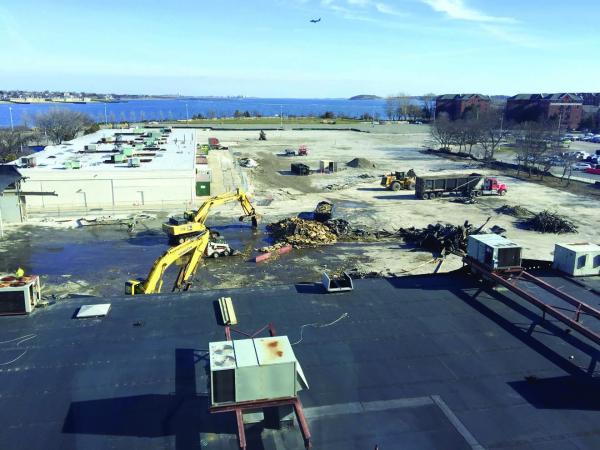November 1, 2018

The Bayside site as seen in early 2017. Reporter file photo
The University of Massachusetts is close to choosing a development partner that it hopes will transform the former Bayside Expo site in Dorchester into a “mixed use business district” with a focus on “emerging innovation industries” that complement the needs of its own campus. The University’s Building Authority (UMBA) has sought to keep the details of their negotiations sealed from public view until the decision to choose one qualified finalist is completed— a process that sources close to the deal say could be finalized by Thanksgiving.
According to several sources familiar with the talks, a number of development teams are still in contention to earn the designation from UMBA, the quasi-public agency that owns the 20-acre site and other UMass properties. Last March, the university hired a real estate broker— Newmark Knight Frank— to vet potential bidders for the Bayside site and to negotiate a price, which UMass President Martin Meehan has suggested could approach or eclipse $200 million. UMass, under the leadership of former Boston campus Chancellor J. Keith Motley, paid $18.7 to acquire the Bayside site in 2010.
After closed-door, bilateral talks between UMass and Robert Kraft about the possibility of building a soccer stadium on the site ended abruptly in 2017, the university issued a “Request for Information” from the region’s development community to gauge interest in redeveloping the waterfront site. Sixteen entities responded in a resounding signal of interest and viability for what the university characterized as a bid to transform the site into a “modern-day Harvard Square.”
In the spring, Newmark Knight Frank began to winnow down the interested bidders for the site with an emphasis on the pricetag and the team’s capacity to complete a large-scale redevelopment. Since that time, UMass officials have resisted attempts to make public more granular information about their talks with individual companies.
In denying a Dorchester Reporter request for information, the Building Authority’s general counsel David Mullen argued that releasing information before the selection process has been completed would “taint the competitive process” and “undermine UMBA’s bargaining position. The harm, obviously, will be to the University and its students when UMBA is unable to participate on equal footing with private entities in the marketplace and, therefore, unable to realize the maximum value of University assets,” Mullen wrote in a letter dated Oct. 24.
However, in arguing against the Reporter’s request for a more general release of documents pertaining to their marketing of Bayside, Mullen did reveal previously unknown details. He wrote: “Based on responses to the RFI, it is apparent that the evaluations and the steps needed to consummate the transaction will not be completed for approximately 18-24 months from now. These evaluations will result in a series of negotiations, hopefully resulting in a potential execution in the fall of 2020.”
In a statement issued this week, Jeff Cournoyer— a spokesperson for UMass— said that the bid negotiations with developers are ongoing and would “remain confidential. At this time, the university continues to evaluate qualified developers based on their capability to generate significant financial benefits for UMass Boston, as well as their ability to deliver a successful project for the campus, neighborhood and the City of Boston,” he said, adding, “but to be clear, the present process will result in the selection of a developer, not a specific project. The developer will then initiate a process with all stakeholders to refine a vision for the property, including the incorporation of public spaces and access to the waterfront. The goal remains the creation of a mixed-use business district that attracts employers from the city’s emerging innovation industries who will align with the campus in a variety of ways, including research collaborations and experiential learning opportunities for students.”
Cournoyer continued: “The university recognizes the importance of this generational project to the neighborhood and is excited about the benefits it will provide to all stakeholders, including new employment opportunities, construction jobs, and retail, dining and cultural attractions.”
If and when UMass does select a preferred developer this fall, the decision will likely be presented to the university’s board of trustees in a closed session, probably in December, according to sources close to the process.
Once a development deal between Bayside and an outside team is finalized, UMass officials have said they will begin an engagement process to include community input. Since UMass is currently exempt from oversight by the Boston Planning and Development Agency (BPDA), which governs most large, private projects, it remains to be seen how much input the city and community residents will have in whatever proposal moves forward.
In an interview with the Reporter last week, BPDA director Brian Golden expressed confidence that UMass and its development partner will include the city in their efforts to plan out what he called a “mammoth” parcel with “tremendous potential there.”
“What happens there is not going to just be UMass classroom space and UMass facilities for their education mission,” Golden told the Reporter. “It’s going to be a broad array of activity covering all the bases. And, so what we in our communications with UMass have made clear, and as well as the mayor himself, is we expect — and UMass, we’re confident will address our desire — we expect strong opportunities for input into the decision making, both the planning and the specific projects that flow from that planning.
“It’s early… but we’ve been grateful that, as a general rule, the state involves the city’s planning and development agency in just about everything,” said Golden.
Villages:
Topics:


